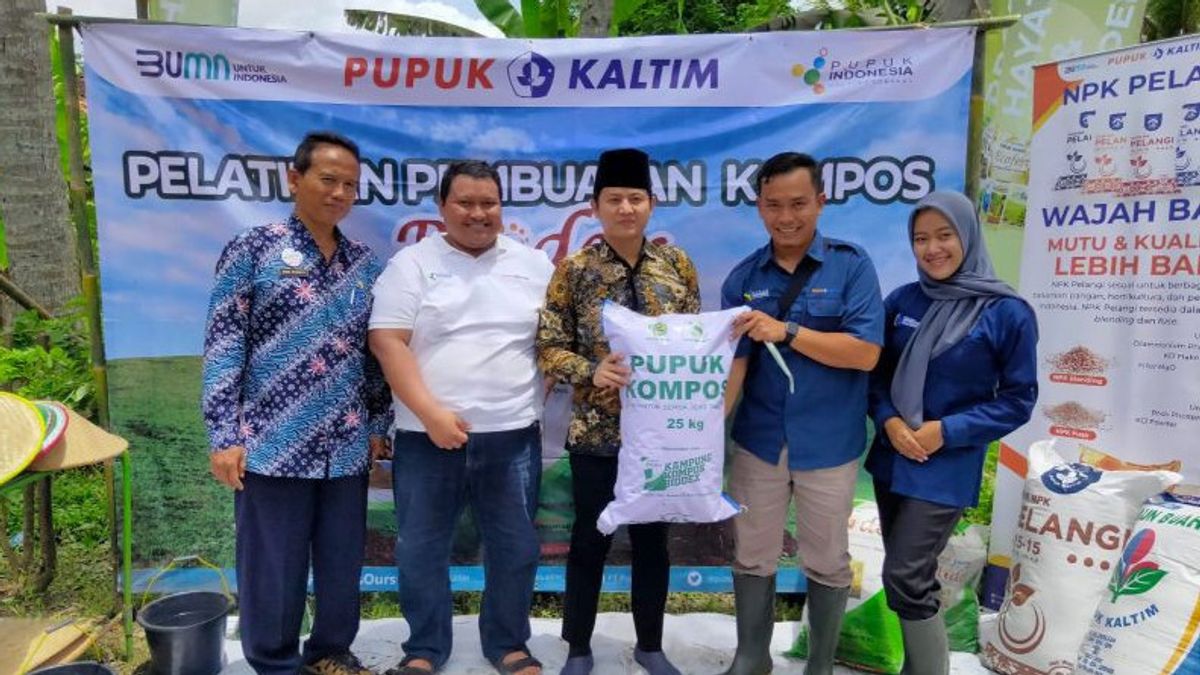PT Pupuk Kalimantan Timur (Pupuk Kaltim) increased support in optimizing the national agricultural sector through the Agrosolution Program for rice commodities in Wononanti Village, Gandusari District, Trenggalek Regency, East Java Province.
Senior Staff of the Vice President of Business Transformation Pupuk Kaltim, Yusva Sulistyo revealed that as a leading agroindustrial company in the country, his party is committed to supporting national food security through quality products, as well as increasing efforts to encourage regional agricultural productivity.
"The Agrosolution program is presented as an integrated agricultural ecosystem through the synergy of SOEs, to provide convenience for farmers in increasing agricultural yield capacity," Yusva said in Jakarta, quoted from Antara, Thursday, November 3.
He said the program was a collaboration between the Trenggalek Regency Government and Pupuk Kaltim and Maxxi Tani, which was marked by rice harvest labs, on Thursday 27 October.
He said, ranging from access to capital and agri input such as seeds, fertilizers and pesticides, crop failure insurance, assistance in the application of agricultural technology to offtakers to guarantee the purchase of commodity products on an ongoing basis.
"From the various facilities provided to the prosperous program, it is hoped that farmers will be more prosperous without worrying that the harvest will not be absorbed by the market," he said.
The assistance of this prosperous program is also an effort to reduce farmers' dependence on subsidized fertilizers, where Pupuk Kaltim presents non-subsidized NPK Pelangi 20-10-10-10 products that are very suitable for increasing rice productivity, with much more efficient use than subsidized fertilizers.
He said, the results were much higher, as evidenced by various demonstration plots and prosperous programs in various regions in Indonesia.
Most recently, the productivity of the rice variety of Ciherang as a result of tiling the BPP Sukorejo in Ponorogo Regency, increased by 20 percent, with an average yield of 7.9 tons per hectare (Ha) compared to the previous maximum of 6.5 tons/Ha.
In the sense that there is an increase in the yield of 1.3 tons/Ha with the use of the 20-10-10-10 Pelangi NPK during the assistance of the Makmur program.
"In addition, Inpari 32 rice commodities in Sukomoro Magetan also experienced an increase in productivity by 20 percent from before, with an average increase of 1.5 tons/Ha," he said.
On that occasion Pupuk Kaltim also provided education on the processing of compost using Biodex biodecomposers for local farmers.
This is considering that the Government no longer has organic fertilizer subsidies, so farmers must start to get used to maintaining their carrying capacity in order to remain productive using organic fertilizers.
Furthermore, Yusva revealed, Biodex is produced by Pupuk Kaltim as a reshuffle bioactivation or degradation of environmentally friendly organic materials, to help improve the quality of agricultural land.
The use of this biodecomposite is intended to accelerate the process of decomposition of organic content, in just 2-3 weeks organic matter is ready to become compost.
"Biodex can be applied without having to add other materials such as molase or sugar cane drops as a catalyst. This has also been proven by farmers in Madiun, Ponorogo, Malang, and Bojonegoro who have carried out compost production independently using Biodex," he said.
Through the education provided, Trenggalek farmers are encouraged to be able to increase their carrying capacity by utilizing Biodex and straw from the harvest, so that the biological nature of the soil can be maintained by organic fertilizer.
Moreover, the content of Biodex is also proven to be able to cope with several diseases in plants such as funarium withering.
“ In addition to reshuffling organic matter, Biodex can also be used as a biopesticide to protect plants from disease attacks. Because there is the content of the Trichoderma sp. bacteria in it, ” concluded Yusva.
Meanwhile, Trenggalek Regent Mochammad Nur Arifin, who was also present at the main harvest and education on the use of Biodex, welcomed the optimism of the implementation of the Prosperous Program by Pupuk Kaltim.
He hopes that this program will be able to increase the productivity of rice farming products while at the same time encouraging the welfare of farmers in the region, especially in the previous three seasons, farmers had lost money due to crop failure.
"From the main harvest this time, it was found that the results were 5.98 tons/Ha. This is quite good, considering that three seasons ago the farmers did not harvest at all. Hopefully, this result can continue to be improved in the future," said Mas Ipin, Mochammad Nur Arifin's nickname.
The English, Chinese, Japanese, Arabic, and French versions are automatically generated by the AI. So there may still be inaccuracies in translating, please always see Indonesian as our main language. (system supported by DigitalSiber.id)








